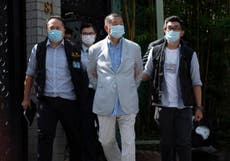Democracy is under threat – it’s time to form a new coalition of nations to protect our freedoms
To mark International Day of Democracy, the world must find a new global democratic system of governance that isn’t afraid to confront authoritarian powers like China
In 1940, author Hallie Flanagan said that democracy “is never won but always to be won”. Today, at a time when democracy is under constant attacks, when a few powerful men try to erode its foundations to accumulate power, it’s time to dream bigger. For democracy to be won, prominent world leaders must ally, unite, and work together to create a global democratic system of governance.
Tomorrow is International Day of Democracy and, as we mark the event, the situation is urgent: democracy has been in constant decline worldwide since 2015. Take the example of the struggle for freedom and democracy in Hong Kong. After more than a decade of protests, and despite surging international sympathy, China is cracking down stronger than ever before on the remaining ripples of freedom in the city.
In fact, the 2019 successful uprising to prevent Beijing from extending extradition powers in Hong Kong was just a pyrrhic victory. On 1 July 2020, the implementation of a draconian security law marked the end of the “one country two systems” framework, the last protection to democracy that Hong Kong had.
Unfortunately, Hong Kong is not an isolated example, but is part of a wider crackdown by the Chinese Communist Party on any form of dissent, from Tibet to Xinjiang, from mainland China to Hong Kong. While the regime is allegedly committing acts of genocide and silencing entire people, the world is, well, mostly silent. China’s unparalleled economic growth and population – larger than that of the American and European blocks combined – mean countries are wary of upsetting the “red dragon”.
China is Africa’s largest single creditor nation, while Greece’s main port has already been integrated into Beijing’s ambitious international investment projects. And this is just the start. In September 2020, during the Chinese foreign minister’s European trip, Germany condemned Beijing's authoritarianism, while at the same time boosting trade ties and thus bringing the two countries closer than ever. This comes at the cost of human rights, democracy, and freedoms. This comes at the expense of human lives.
The truth of the matter is that single nations cannot meaningfully act against major authoritarian powers, and are often too afraid to do so. One country alone cannot impact China's iron fist and stand a chance against its economic muscles.
The fundamental flaw of the 21st century is the fact that people stopped dreaming big enough. While the United Nations’ creation was a big step forward, it was only the first step. How can the UN’s founding charter not, even once, include the term democracy? In the Security Council alone, which we believe is both the most undemocratic body of the United Nations and its most potent, two of the five permanent members are authoritarian regimes. Another approach is needed, one that puts democracy at its core. The world must find a new global democratic system of governance, fast.
Obviously, a global democratic government will not be created overnight, but major economic powers can start the work by coming together and forming an alliance to defend and uphold freedoms. Existing structures can be the stepping stone for such an alliance. For example, the G7 – an outdated group of countries that is unrepresentative and lacks a clear purpose – could be transformed into the Democratic 10 (D-10) with the aim of protecting democracy. By adding to the G7 countries (Canada, France, Germany, Italy, Japan, the United Kingdom, and the United States) Australia, India, and South Korea, the group will gain in economic and diplomatic strength. A last bastion of hope can be moulded out of an anachronistic structure.
It goes without saying that there are key players missing from the list. Ideally, in the future, all democractic nations will join this union and form a global government by the people, for the people. However, the work must start somewhere. Urgent action is needed and the D-10 would advocate for a more democratic world.
Exactly as the Second World War brought, along with destruction, the appetite for international cooperation, the current struggles for freedom – from Belarus to Hong Kong – might have reignited that desire. Once more, Hong Kong offers a strong example of this. On 3 July, just two days after the national security law started to curb Hong Kong's freedoms, an international campaign was created by global campaign movement Now! to mobilise people and protests in front of Chinese embassies and consulates. Every Friday, under the banner #FridaysForFreedom, people from Australia to Argentina, from South Africa to Canada, protest. In the span of two months, the campaign reached more than two million people online. The ask is clear: D-10 countries must ally to coordinate economic and diplomatic sanctions against China to protect Hong Kong.
As the Iranian activist Shirin Ebadi once said: “Democracy is not something that occurs overnight. It is not a gift delivered on a golden tray. Democracy is a long process of fighting, challenging accepted ideas, and perpetually striving for freedom. Like a seed that has to be watered every day to become a flower, democracy needs constant attention and care.” It's time to plant a new seed to ensure that democracy can flourish under humanity's constant care. It's time for a global, democratic, and accountable system of governance. It's time to venture into new horizons. It's time for the D-10.
Andrea Venzon and Colombe Cahen-Salvador are co-founders of Now!, a global campaign movement pushing for humanity to work as one to solve the biggest challenges of our time




Join our commenting forum
Join thought-provoking conversations, follow other Independent readers and see their replies
Comments